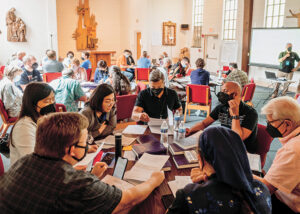Spiritual directors thanked for their Lenten prayer guide
Re: “Lenten prayer sheet reflects Lululemon spirituality” letter, March 12, page 7.
The references to the Lenten prayer guide as “scriptural soundbites, social-justice propaganda and Lululemon theology” that is “hacking away at the roots of faith” are inflammatory rhetoric that is unproductive, not to mention deeply unkind. Members have the right to agree and disagree, and take to task things happening in the church, but if we call names or use mockery to express ourselves, we are headed for worse than disagreement.
I thank the Mennonite Spiritual Directors of Eastern Canada writers for the biblical study, thoughtful time and prayerful work they put into the 2018 “Lenten Guided Prayer Experience,” called “The courage to covenant,” that focusses on our relationships with God, each other and creation.
They risked public criticism and the questioning of their faith by referring to LGBTQ Christians in a positive way—one small point in a dozen pages of guided prayer and biblical reflection—noting the “life-giving/life-saving significance” of the rainbow as a symbol of “safety and belonging.”
I recently heard a gay speaker affirm the importance of rainbow stickers in public places, small assurances that he is entering a place of safety and respect, where he doesn’t need to worry about how he or his family will be received. I can’t fully understand what that is like but I can try to learn, and the prayer sheets help in one small way.
I’m thankful for a mention of the Seventh Generation Principle “found in many Indigenous cultures” about our effect on the environment.
I’m also thankful for the use of “Eternal One,” “Holy One” and “Godself” alongside the male names for God. We worship God, not gender, and the variety of names and metaphors for God in the Bible direct us so.
—Kristen Mathies, Waterloo, Ont.
The author is a member of Rockway Mennonite Church, Kitchener, Ont.
‘Lululemon spirituality’ means ‘God’s love has reached everyone’
Re: “Lenten prayer sheet reflects Lululemon spirituality” letter, March 12, page 7.
Marcus Poetzsch has used his full and considerable powers of word craft in drafting this churlish letter. It is ironic that the very nature of the Mennonite church, centred on a spirit of inclusion, is what allows a letter like this to be published.
His characterization of Mennonites as believing in a benevolent God, using “scriptural soundbites,” trafficking in “social justice propaganda” and possessing “Lululemon spirituality” land with me as affirmations of my own beliefs and of those of the Mennonite church, grown through deep roots in history.
He ignores huge swathes of the Bible, as well as its overarching theme of love in his analysis:
- God is love, and God’s love is infinite and all-encompassing and extravagant.
- Social justice was not just part of Jesus’ ministry, it was all of Jesus’ ministry.
- “Lululemon spirituality” means the message of God’s love has reached everyone, the lowest common denominator. How is that not good news?
- He sees Mennonites as following what is culturally de rigueur, but God’s love never goes out of style.
Furthermore, we live in an open and democratic society where all are free to express their faith and to prayerfully choose a church with undiluted theology with which they agree. For me, that church is the Mennonite church, where I have found a rich and solid foundation of Scripture, community, acceptance and love. I want to live a joyful and faithful life in Christ, undergirded by the Mennonite church.
—Elinor Snell, Waterloo, Ont.
The author is a member of Waterloo North Mennonite Church in Waterloo.
‘Grateful we are’ for Anabaptist Essentials
Re: “Anabaptist Essentials ‘a quintessential travesty’” letter, Feb. 12, page 7.
Wayne Northey’s critique of Palmer Becker’s latest book, Anabaptist Essentials, does not deserve quite the indignation he shares with us in his letter. If Becker has not quite adequately documented his overview of early Anabaptist history, the essence is nonetheless very clearly and pastorally communicated in this brief and very readable book that is not necessarily intended for the academics.
In our congregation, this book has been utilized as adult Sunday school material for the last several months. Our class has a nice multicultural mix of new Christians and seasoned Mennonites, and we literally read it in class, chapter by chapter, stopping at will to discuss paragraphs pregnant with edifying information that is helping all of us to discover or review the profound gift of being Anabaptist Christians, especially in today’s “fragmented” world. Grateful we are not only for the cognitive learning but also for a fresh experience of Jesus, the centre of our faith.
—Jacob C. Froese, Calgary
Ethics not the basis for Christian unity
Re: “Our baseline for unity,” March 12, page 7.
Garry Janzen has raised a very important point with regard to Christian unity and how to get there. Unfortunately, the baseline he proposes for unity is precisely the cause of disunity. “You can’t get there from here.”
The issue for Mennonites, as he puts forward, is following Jesus faithfully as a community that gathers to learn and internalize the life and teachings of Jesus: “To follow him is to go where he has gone and to go where he continues to be. Walking with Jesus gives the comfort of knowing we are with him but also leads to places where we have never been.” I affirm all that.
But it is precisely the details of following Jesus upon which there is so much disagreement. Does following Jesus include acceptance of gay marriage? Does it require support for the present State of Israel and its policies? Does it mean that we choose missions over Mennonite Central Committee?
The controversy over these and related issues can never achieve unity. There will always be legitimate disagreement over ethical details. Therefore, ethics cannot be the basis for Christian unity.
Why not look for a baseline in what we already agree on? How about: “I believe in God the Father Almighty, Maker of heaven and earth,” and that this God is the Father of our Lord Jesus Christ whom he has made Lord of all things? No matter how uncompromisingly we disagree on ethical issues, could we, as Christian believers, use that creedal confession as the baseline upon which our unity could grow and expand?
It might even be easier to deal with specific ethical issues if we affirm together, to begin with, our faith in God through Christ.
—Walter Klaassen, Saskatoon
Open letter on Syria by MCC leaders
“If one member suffers, all suffer together with it” (I Corinthians 12:26).
In February, we were part of a Mennonite Central Committee (MCC) delegation to Syria, including Damascus, Homs, Hama and Aleppo. We witnessed the devastation of war and heard testimonies of faith from people who have been living in difficult circumstances now for seven long years.
“You have suffered with us and rejoiced with us,” one of our partners told us. Said another: “Your presence with us is a sign of hope that God is not far from us.”
From our Syrian partners we hear clearly that the horrors of this war are being perpetrated by armed actors on all sides. We strongly decry all violence, including air-and-ground-based strikes, shelling and sieges of civilian areas.
We are also keenly aware of our own governments’ roles in the conflict. Canada and the U.S. are part of the Global Coalition to Defeat ISIS that was formed in 2014, and the U.S. has carried out thousands of airstrikes, maintains about 2,000 troops in Syria and provides support to various opposition groups.
We call on our governments—and all parts of the international community who are involved in the conflict—to immediately cease all military involvement in Syria.
Rather than fuelling the flames of violence, we call on our governments to urgently support diplomatic efforts to bring an end to the war and to provide generous humanitarian assistance for those who are in need.
MCC is committed to continuing to partner with Syrians as they seek a just and peaceful future. MCC supporters have already been generous, but we ask you not to stop helping now. Contributions can be made at mcccanada.ca/syria-iraq.
And we encourage you to contact your elected officials. More information can be found at mccottawa.ca.
—J. Ron Byler and Rick Cober Bauman
J. Ron Byler is MCC U.S. executive director. Rick Cober Bauman is MCC Canada executive director.









Leave a Reply
You must be logged in to post a comment.